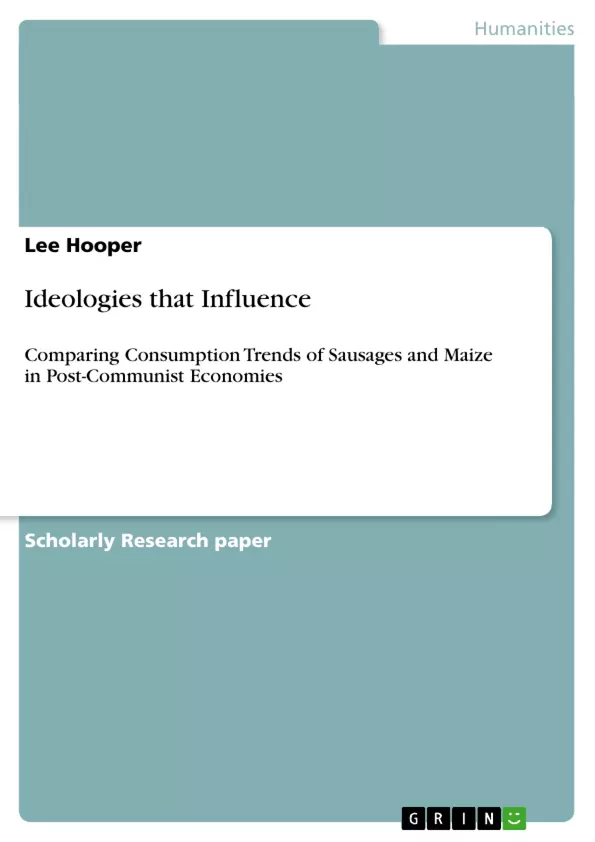The link between ideology and identity has the potential to be a powerful and transforming catalyst, with food often taking on a symbolic nature outside of its original context. In the article The Soviet Sausage Renaissance (Klumbyte, 2010), the author points towards how the term ‘Soviet’, a word with negative connotations in post-communist Lithuania, has been transformed into a successful marketed brand of sausage. By reinventing the original association of the term Soviet, which denoted “colonization, oppression...and cultural backwardness...of the nation”, the company changed it to a representation of nature and striving for the highest quality (Kumbyte, 2010, p. 23-27).
Inhaltsverzeichnis (Table of Contents)
- Ideologies that Influence: Comparing Consumption Trends of Sausages and Maize in Post-Communist Economies
- References
Zielsetzung und Themenschwerpunkte (Objectives and Key Themes)
This article examines how ideologies influence consumption trends of sausages and maize in post-communist economies. It explores the symbolic nature of food and how it can be used to represent identity and political beliefs.
- The link between ideology and identity in relation to food consumption
- The transformation of the term "Soviet" from a negative connotation to a successful brand of sausage in post-communist Lithuania
- The decline of maize consumption in China due to its association with communist ideology
- The role of urbanization and Western consumer-oriented ideology in shaping food consumption patterns in China
- The changing perceptions of maize as a "poor man's food" in various cultures
Zusammenfassung der Kapitel (Chapter Summaries)
The article begins by discussing the power of ideology in shaping identity and how food often takes on symbolic meanings beyond its original context. The example of the Soviet sausage renaissance in Lithuania is presented as a case where a negative connotation associated with the term "Soviet" was transformed into a positive brand identity. The article then shifts to China, exploring the decline of maize consumption as a result of its association with communist ideology. The Maoist regime's policies promoting self-sufficiency and strategic necessity led to a decline in the popularity of maize in China. Furthermore, the article discusses the perception of maize as a "poor man's food" in various cultures, including China, Bhutan, and Mexico. This negative perception is attributed to factors such as low nutritional value and association with poverty. The article concludes by emphasizing the powerful role of ideology in shaping food consumption patterns and how these patterns can reflect broader cultural and economic changes.
Schlüsselwörter (Keywords)
The key terms and concepts in this article are: ideology, identity, food consumption, post-communist economies, sausages, maize, symbolic meaning, communist ideology, urbanization, Western consumer-oriented ideology, cultural perceptions, and economic development.
Frequently Asked Questions
How does ideology influence food consumption?
Ideologies can give food symbolic meanings, such as representing national identity, social status, or political resistance, which dictates consumer choices.
What is the "Soviet Sausage Renaissance" in Lithuania?
It refers to the rebranding of the term 'Soviet' from a negative political connotation to a successful marketing brand associated with quality and nature.
Why did maize consumption decline in post-communist China?
Maize was heavily associated with communist Maoist policies of self-sufficiency, leading modern consumers to reject it in favor of Western-oriented trends.
What does "poor man’s food" mean in various cultures?
In many cultures, certain foods like maize are perceived as inferior due to their historical association with poverty and lack of nutritional variety.
How does urbanization change food patterns?
Urbanization often brings a shift toward Western consumer-oriented ideologies, moving away from traditional or ideologically-charged staple foods.
- Arbeit zitieren
- Lee Hooper (Autor:in), 2012, Ideologies that Influence, München, GRIN Verlag, https://www.hausarbeiten.de/document/233067


